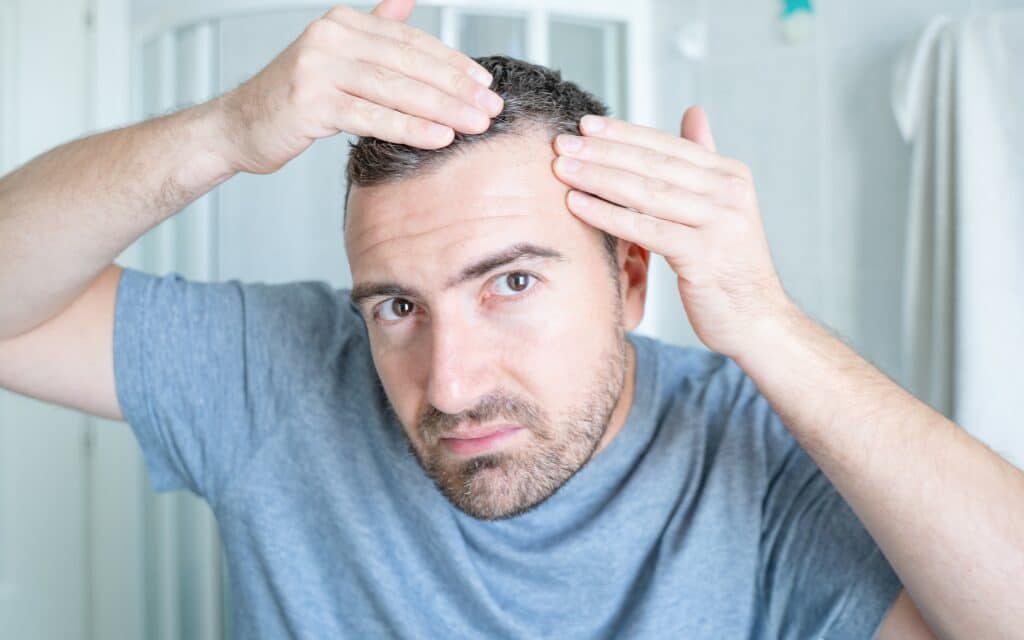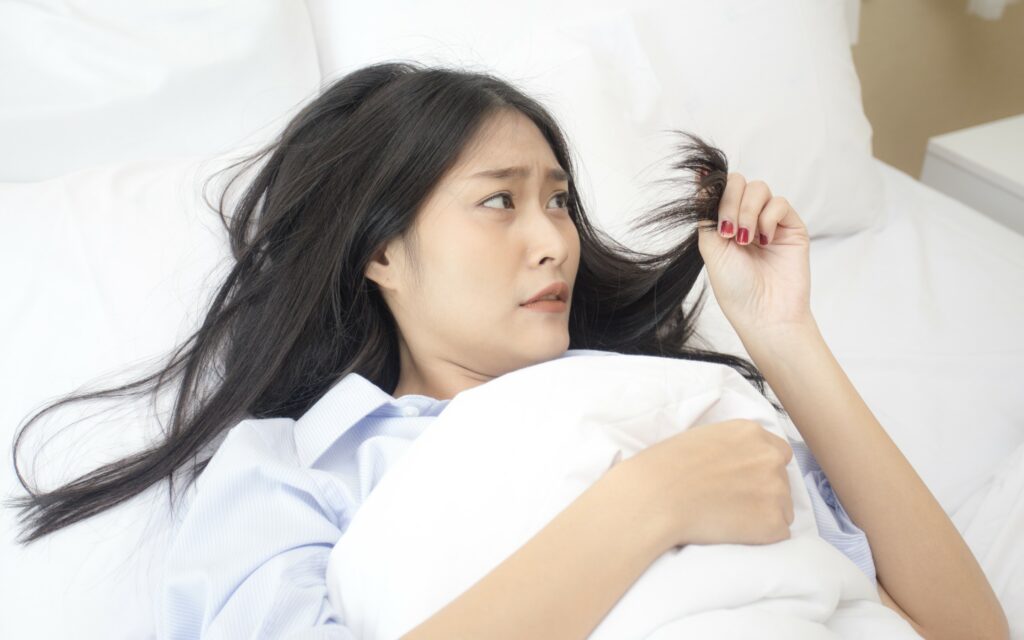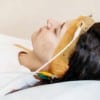It might make the hair stand up on the back of your neck, when reading the answer to: “Can lack of sleep cause hair loss? “
While lack of sleep and hair loss might not seem to be connected at first, the truth is that trouble sleeping could actually cause your hair to thin. Sleep deprivation causes a number of complex side-effects, ranging from anxiety and depression to a higher risk of heart attack and stroke. Hair loss is just one potential outcome.
While not everyone with sleeping problems is guaranteed to have bald spots, just as a certain amount of quality sleep can’t ensure a full head of hair, there is some connection between sleep and hair loss.
Today, we’re going to be looking at the ways lack of sleep can affect your ability to produce healthy hair. We’ll also let you know what you can do to overcome insomnia-induced hair loss.
What causes hair loss?
To understand the connection between sleep and hair loss, we first need to know why hair loss happens. There are a number of reasons why a person may begin to lose their hair over time. Hair loss is most commonly preconditioned by family genetics. Male/female pattern baldness, otherwise known as androgenetic alopecia, is the most common cause.
However, it’s also possible to experience more temporary problems with hair loss. It could be caused by hormonal, or medical conditions, like pregnancy, or a thyroid problem.
Sometimes, you can even increase your risk of losing your hair by taking certain medications. Or you might be using specific hair treatments, which place a lot of stress on the scalp, like chemical straightening.
When hair loss isn’t influenced by genetics, one of the most common causes is stress. Lack of sleep naturally places the body under a significant amount of additional stress, not just emotionally, but physically. This means you could end up losing your hair as a side effect of the stress you feel when you’re sleep deprived.
What’s more, some studies suggest lack of sleep can even trigger genetic issues which otherwise might have waited longer to appear. For instance, the stress brought on by continued sleep deprivation, according to one study published in 2017, could cause genetic traits like androgenetic alopecia to appear faster.

Hair raising facts: Does lack of sleep cause hair loss?
While failing to get a certain number of hours of sleep each night won’t automatically cause hair loss, lack of sleep does put you in a position where you’re more likely to suffer from thinning and baldness.
As mentioned above, lack of sleep promotes high levels of stress, which makes hair loss more likely. There are various ways stress created by lack of sleep can cause hair loss, including:
Telogen Effluvium (TE)
When the body is stressed due to lack of sleep, various natural cycles, including the cycle of hair growth, are disrupted. Your scalp is covered in thousands of hair follicles consistently going through four stages of growth:
- Anagen phase: This is when your hair grows, and the stage usually lasts 2-7 years.
- Catagen phase: A 2-week period when the hair follicle shrinks
- Telogen phase: The 3-month resting period with no growth
- Exogen phase: When the follicle sheds the hair and starts the growth again.
Telogen Effluvium, or TE occurs when the number of hair follicles growing hair suddenly changes. If the change happens during the Telogen stage, it can also result in shedding.
Alopecia Areata
AA, or Alopecia Areata is an autoimmune disease, which involves your immune system mistakenly attacking hair follicles. AA can definitely be triggered by stress. It can cause hair loss across the entire scalp, and even in various other parts of the body.
With Alopecia Areata, hair may fall out and regrow repeatedly over a period of time. This condition affects around 6 million people in the United States, and though there’s no cure, there are solutions which can help with hair regrowth.
Unfortunately, some solutions for regrowing hair can also make insomnia worse. The drug Finasteride for male pattern baldness is known to cause sleep disturbances.
Trichotillomania
Stress can sometimes promote psychosomatic responses, like trichotillomania, or hair pulling disorder. This involves experiencing an urge to pull hair from your scalp, eyebrows, and other parts of your body.
The condition often develops in pre-teens, but it can last a lifetime. It can be significantly worsened by the increase of stress a lack of sleep might cause.
Sleep, Sleep apnea, and hair loss
Research into sleep and hair loss also suggests there may be a connection between sleep apnea. Especially the ability to grow and maintain healthy hair. A study in 2014 found a link between the consistency of the circadian rhythm (our sleeping pattern) and the integrity of regenerated cell tissue.
This study found the disruption of the circadian rhythm can also disrupt the cell regeneration cycle, changing the performance of our skin, and hair follicles. People suffering from sleep apnea, even if they don’t appear to be sleep deprived, are still dealing with disrupted circadian rhythms.
When you’re living with sleep apnea, you’re not getting the right levels of restful sleep during the night, which means your body doesn’t have time to rejuvenate, recover, and repair itself.
Many people with sleep apnea also suffer from issues with melatonin secretion. While melatonin is one of the most important hormones for the sleep cycle, it also plays a role in cell regeneration, which is why the substance often appears in topical solutions for hair loss.
Like people experiencing full sleep deprivation, people with sleep apnea often end up with a significant “sleep debt” over time, caused by consistently disrupted patterns of rest.
In conclusion to this connection between sleep apnea and hair loss, it’s important to seek treatment, if you have symptoms of sleep apnea. There’s a known link between stress and sleep apnea too.

Is hair loss from lack of sleep reversible?
If you’re dealing with lack of sleep or hair loss, it’s common to ask, “will my hair grow back if I sleep more?” The answer to this question depends on the underlying cause of your hair loss.
If you’re experiencing hair loss as a result of stress causing conditions like trichotillomania, or telogen effluvium, then improving your sleeping pattern should help your hair to grow back. Some people with alopecia areata also experience hair re-growth, though not everyone will.
If you don’t have an underlying problem causing the hair loss, like a genetic condition or an illness, then removing the source of the stress, (the lack of sleep) should make a significant difference. However, it may take a while for all of your hair to grow back.
You can promote healthy hair regrowth, and reduce the risk of future problems by:
- Practicing good sleep hygiene: Consistently work on developing good sleep hygiene patterns. This includes following specific schedules for when you wake up and go to bed. Also make sure your sleeping environment is as comfortable as possible.
- Following a routine: Having a specific routine before you go to bed can be a good way to help yourself relax and fall off to sleep. For instance, stop using your phone an hour before bed, and drink a cup of chamomile tea to relax.
- Caring for your hair and scalp: Use regrowth shampoos, conditioners, and scalp treatments to give your hair follicle the extra support you need. If necessary, you may need to consider psychotherapy and similar treatments to reduce your urge to pull your hair.
Will hair grow back from lack of sleep? The caveat
While hair loss caused by stress from lack of sleep will usually grow back, this won’t be the case in all circumstances. As mentioned above, lack of sleep can also put your body under significant physical stress. This can exacerbate and accelerate hereditary hair loss.
If you’re genetically predisposed to hair loss, due to a condition like male or female pattern hair loss, this is a progressive condition, which doesn’t simply get better. Although you can use medications and various treatments to slow your hair loss and even re-grow some hair, simply getting a better night’s sleep won’t cause the hair to grow back.
The best thing you can do if you’re struggling with a lack of sleep and hair loss is speak to a doctor. Your medical professional will be able to provide insights into where the hair loss is coming from, and check for underlying conditions.
Siestio. Sleep Matters.
Now read these:
—Does anemia cause insomnia?
—Adaptogens for better slumber
—Can’t sleep without your man?
Medical disclaimer
You must not rely on the information provided on our website as an alternative to medical advice from your doctor or other healthcare professionals. For more information read our full disclaimer here.







